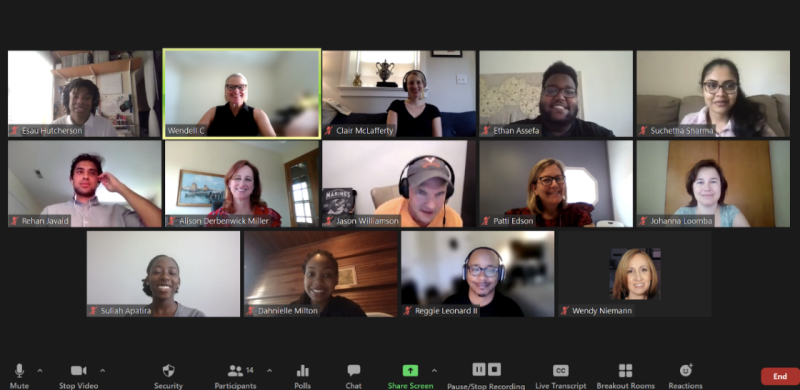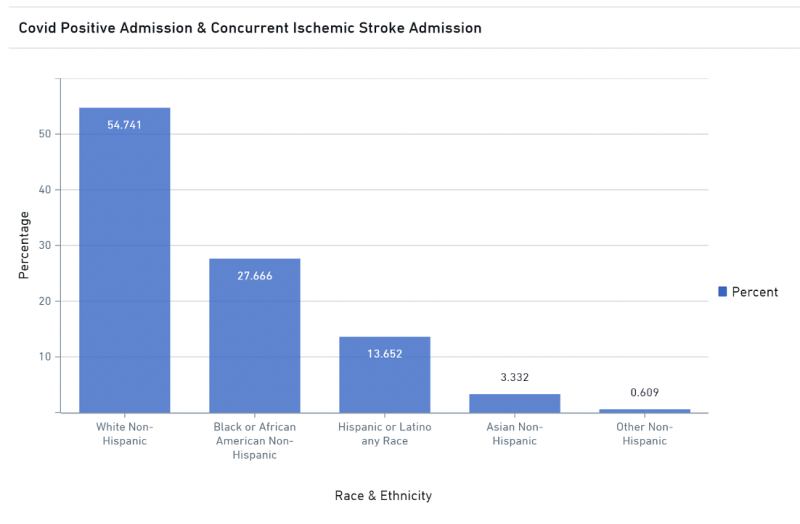Health Equity, the Focus of HBCU Summer Research Program Students’ Work, Could Lead to “Actionable Insights” and “Social Change” say Industry Leaders

Five undergraduate students from the University of Virginia, Spelman College and Howard University spent 10 weeks this summer conducting research and analyzing large data sets to better understand the impact of COVID-19 on the health of racial minorities in Charlottesville and Albemarle communities and beyond.
The five undergraduate students – Suliah Apatira, Ethan Assefa, Esau Hutcherson, Rehan Javaid and Dahnielle Milton – found that:
- Black, Hispanic, and Indigenous Americans have 1.5 times higher infection rates, 4 times higher hospitalization rates, and 2.7 times higher death rates than White Americans
- Black and Hispanic Americans between the ages of 35 and 44 are 8 to 11 times more likely to die following COVID infections compared White Americans
- Vaccination rates are 2 to 4 times higher for White Americans than Black Americans
- The cause of these disparities may be multifactorial, including a lack of access to healthcare and vaccinations, as well as health care bias
The students were part of the UVA-HBCU Summer Research Bridge to Data Science program, working closely with UVA School of Data Science professors, industry leaders from the Deloitte AI Institute for Government and Oracle for Research, and iTHRIV. Their goal was to research fundamental questions around health equity among underrepresented populations.
Program sponsors Deloitte and Oracle met with the students throughout the summer to discuss their research, answer questions, provide career advice, and discuss trends and opportunities at the intersection of data science and healthcare.
“These students are seeing firsthand how powerful data science can be for creating compelling stories, driving policy, and creating social perceptions and change. I am excited to see how they use their powers for good,” said Alison Derbenwick Miller, Vice President, Oracle for Research.
“With this effort, we hope to help bridge the gap in health disparities experienced by so many communities today,” said Tasha Austin, Advisory Principal, Deloitte & Touche LLP, and Director of Deloitte’s AI Institute for Government. “We are excited to support the students’ career development and strengthen their understanding and skills in the areas of STEM and AI so they can help expand access to health care when they graduate.”
As part of the program, the students also researched racial disparities in medical resource allocation in ischemic stroke patients who were COVID-19 positive. They posed the question, “Is there equity of patient care in people with concurrent ischemic stroke and COVID positivity?”
They used race/ethnicity, age, and insurance types as equity variables and COVID-19 treatment, mortality, and clinical comorbidities as medical variables. Their research indicated:
- White Non-Hispanics support the national population trend for COVID positive diagnosis
- Asian Non-Hispanics have the highest mortality rate and Ecmo treatment, yet the lowest average comorbidities and Remdesivir treatment
- Black/African Americans have the highest comorbidities and lowest mortality rate
- Hispanic/Latinos received the highest Remdesivir treatment and have a significant mean of comorbidities
- Other Non-Hispanics make up the smallest population yet received a significant percent of Remdesivir and Ecmo treatment

The team created a heat map to display COVID-19 positive admission and concurrent ischemic strokes. They found that the greatest concentration of patients were from the East Coast and Midwest, with relatively low concentrations from the West Coast.
Don Brown, Senior Associate Dean for Research and Quantitative Foundation Distinguished Professor at the School of Data Science, worked closely with the students throughout the summer.
“They are doing amazing work,” Brown said. “We know that COVID impacted communities of color worse than it did the white communities. These students have been putting numbers to this and studying what can we learn about what has happened in this pandemic, what we can correct in the future, and how we can try and improve health outcomes for these communities.”
In addition to the extensive research accomplished throughout the Summer Research Bridge to Data Science program, leaders from Deloitte and Oracle met regularly with the students to discuss broader topics in data science, including the importance of mentorship, explainability of research, and ethical AI.
In one meeting with corporate sponsors, Ethan Assefa raised questions about the power of data science and how it is used, specifically in regard to vulnerable populations. “How do you reconcile the tremendous potential within the field of data science with its dangerous propensity to further harm marginalized classes?”
“It is hyper complex,” responded Jason Williamson, Vice President of Oracle for Startups and Oracle for Research and Lecturer at SDS. “It is a process of learning to walk in tension between the two, constantly being aware of data science’s power for social good and social harm.”
For Suliah Apatira, who plans to attend medical school, the summer research program’s focus on the COVID-19 pandemic combined her interests of data science and healthcare.
“As a future physician, I have always been interested in health equity and outcomes,” Apatira said. “Last summer I learned to code. I hadn't been able to bridge the two together until this summer. This summer has helped me a lot. Key takeaways have been problem solving and conflict resolution when it comes to research based coding. We have had to tweak things, be patient, and rework our methods. I am excited to see more outcomes.”
The Deloitte and Oracle mentors enjoyed working with the students, seeing the progress they achieved throughout the summer, and helping them understand the results of their research.
“We are extremely grateful to Deloitte and Oracle for Research for both their financial support of this program as well as the extremely thoughtful and valuable career development programming and mentorship they have provided these students,” said Wendell Collins, Director of Development at the School of Data Science. “We could not put on this program without them, and we look forward to continuing the momentum of this program in the future. These students are the future of data science at the intersection of bioinformatics and healthcare.”
As part of the program, the students made final presentations to their sponsors, the SDS community, and to the annual UVA Biocomplexity Institute Data Science for the Public Good Symposium.